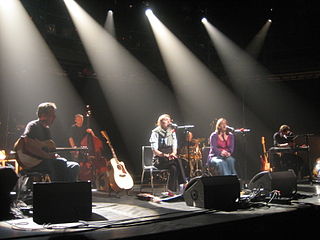
Nikolaus “Nik” Welter was a Luxembourgish writer, playwright, poet, professor, literary critic, and statesman. He wrote predominantly in German. He also served as a Minister for Education in the government of Émile Reuter.

Rumelange is a commune with town status in south-western Luxembourg, on the border with France.

The culture of Luxembourg refers to the cultural life and traditions of Luxembourg. Most citizens are trilingual, speaking French and German in addition to the Germanic national language of Luxembourgish. Although its contributions to the arts are not largely known outside its borders, Luxembourg has a rich cultural history, especially in music, painting and photography. Its evolving museums, concert halls, theatres and galleries testify to its citizens' growing appreciation of culture.

Luxemburger Wort is a German-language Luxembourgish daily newspaper. There is an English edition named the Luxembourg Times.

Claudine Muno is a Luxembourgian author, singer, musician, music teacher, and journalist.

The National Literature Centre, abbreviated CNL, is the national literary archive of Luxembourg. It is based in the town of Mersch, about 15 kilometers to the north of Luxembourg City. Created as a research library in 1995, the CNL's collections include more than 40,000 volumes, a majority of them written by authors of Luxembourgish descent or residing in Luxembourg, as well as an ever-growing collection of manuscripts, letters and personal items. The library also collects newspaper clippings relating to Luxembourgish literature and literary journals and serials. As one of Luxembourg's legal deposit libraries, it receives copies of nearly all books produced in Luxembourg and actively purchases monographs by Luxembourgish authors printed abroad.

Jean Portante is a Luxembourg writer who resides in Paris. He has written novels, stories, plays, journalistic articles and poetry, and has been widely translated.

Roger Manderscheid was a writer from Luxembourg. He won the Batty Weber Prize in 1990 for his literary work and the inaugural Servais Prize in 1992 for De Papagei um Käschtebam.

Batty (Jean-Baptiste) Weber (1860–1940) is considered to have been one of Luxembourg's most influential journalists and authors, contributing much to the development of the country's national identity. His style is characterized by his sense of humour and skillful use of irony.
Anise Koltz is one of Luxembourg's major contemporary authors. Best known for her poetry and her translations of poetry, she has also written a number of children's stories. In 1962, she was a cofounder with Nic Weber of the successful literary conference series Journées littéraires de Mondorf in which she has always played a key role.

Antoine Meyer, also known as Antun or Tun Meyer (1801–1857) was a Luxembourg-born mathematician and poet who later adopted Belgian nationality. Sometimes referred to as the father of Luxembourgish literature, he is remembered for publishing the very first book in Luxembourgish, a collection of six poems entitled "E' Schrek ob de' lezeburger Parnassus".

Guy Rewenig is a Luxembourg author and novelist. In 1985, he wrote the first novel in the Luxembourgish language although poems and theatrical works had appeared in the 19th century. Together with Roger Manderscheid, he is credited for initiating the current trend for novels written in Luxemburgish.
The Batty Weber Prize or Prix Batty Weber is Luxembourg's national literary prize. It has been awarded every three years since 1987 to a Luxembourg writer for his entire literary work. It is named after the writer Batty Weber (1860–1940) who considerably influenced Luxembourg's cultural life.
Nico Helminger is a Luxembourg author who has written poetry, novels, plays and libretti for operas. In 2008, he was awarded the Batty Weber Prize for his literary work.

Lambert Schlechter is a Luxembourg author who has published some 30 books written in French, most of them published in France and two written in German published in Luxembourg. His work includes poetry, novels, short stories and essays. A great number of contributions to newspapers, magazines and anthologies in different countries. Since 2006 he is working on a greater prose project under the general title "Le Murmure du monde": a collection of literary, philosophical and autobiographical fragments; so far seven volumes have been published, VIII, IX and X are in preparation.
Georges Hausemer was a Luxembourgish writer who published short stories, novels, travelogues and non-fictional works and also translated a considerable number of works from French, English, Spanish and Luxembourgish into German. Sometimes using the nom de plumeTheo Selmer, he also worked as an illustrator.

Josy (Joseph) Braun was a Luxembourg writer, journalist and translator who wrote mainly in Luxembourgish.

Emile Hemmen, born in Sandweiler on 6. December 1923, is a lyric poet and writer from Luxembourg who lives in Mondorf-les-Bains.

Germaine Goetzinger is a Luxembourg writer, historian, educator and feminist. From 1995 to 2012, she headed Luxembourg's Centre national de littérature. In 2011, she was awarded the Lëtebuerger Bircherpräis for fostering collaboration in literary circles and for her outstanding contribution to documentary and analytical research into Luxembourg's literature.
Anna Justine Leader is a Luxembourg poet and novelist who writes in English. She has won several awards including Luxembourg's national literary contest for young authors, first for her novel A Several World in 2014, then for her poetry collection A Lifetime Lies in 2015, and finally for her play Outlast in 2018.

















